实验五
1.实验任务1
task1_1.c
1 #include<stdio.h> 2 #include<stdlib.h> 3 #define N 4 4 5 int main() 6 { 7 int x[N] = {1,9,8,4}; 8 int i; 9 int *p; 10 for(i = 0;i < N;i++) 11 printf("%d",x[i]); 12 printf("\n"); 13 14 for(p = x; p < x + N;++p) 15 printf("%d",*p); 16 printf("\n"); 17 18 p = x; 19 for(i = 0;i < N;i++) 20 printf("%d",*(p+i)); 21 printf("\n"); 22 23 p = x; 24 for(i = 0;i < N;i++) 25 printf("%d",p[i]); 26 printf("\n"); 27 28 system("pause"); 29 return 0; 30 }

task1_2.c
1 #include<stdio.h> 2 #include<stdlib.h> 3 4 int main() 5 { 6 int x[2][4] = {{1,9,8,4},{2,0,4,9}}; 7 int i,j; 8 int *p; 9 int(*q)[4]; 10 11 for(i = 0;i < 2;++i) 12 { 13 for(j = 0;j < 4;++j) 14 printf("%d",x[i][j]); 15 printf("\n"); 16 } 17 18 for(p = &x[0][0],i = 0;p < &x[0][0] + 8;++p,++i) 19 { 20 printf("%d",*p); 21 if((i+1)%4==0) 22 printf("\n"); 23 } 24 25 for(q = x;q < x + 2;++q) 26 { 27 for(j = 0;j < 4;++j) 28 printf("%d",*(*q+j)); 29 printf("\n"); 30 } 31 32 system("pause"); 33 return 0; 34 }
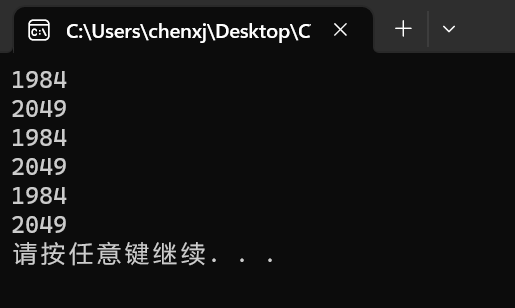
2.实验任务2
task2_1.c
1 #include<stdio.h> 2 #include<stdlib.h> 3 #include<string.h> 4 #define N 80 5 6 int main() 7 { 8 char s1[] = "Learning makes me happy"; 9 char s2[] = "Learning makes me sleepy"; 10 char tmp[N]; 11 12 printf("sizeof(s1) vs. strlen(s1):\n"); 13 printf("sizeof(s1) = %d\n",sizeof(s1)); 14 printf("strlen(s1) = %d\n",strlen(s1)); 15 16 printf("\nbefore swap:\n"); 17 printf("s1: %s\n",s1); 18 printf("s2: %s\n",s2); 19 20 printf("\n swapping...\n"); 21 strcpy(tmp,s1); 22 strcpy(s1,s2); 23 strcpy(s2,tmp); 24 25 printf("\nafter swap: \n"); 26 printf("s1: %s\n",s1); 27 printf("s2: %s\n",s2); 28 29 system("pause"); 30 return 0; 31 }
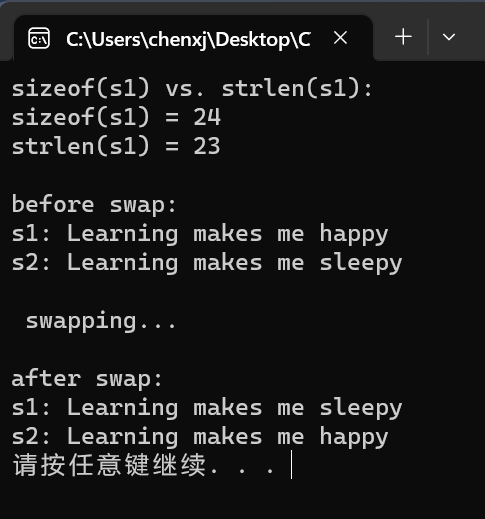
问题1:大小是24个字节。sizeof(s1)计算的是字符串数组所占空间的大小,strlen(s1)统计的是字符串的字符长度。
问题2:不能。给一维数组定义时要说明长度分配内存。
问题3:交换了。
task2_2.c
1 #include<stdio.h> 2 #include<stdlib.h> 3 #include<string.h> 4 #define N 80 5 6 int main() 7 { 8 char *s1 = "Learning makes me happy"; 9 char *s2 = "Learning makes me sleepy"; 10 char *tmp; 11 12 printf("sizeof(s1) vs. strlen(s1):\n"); 13 printf("sizeof(s1) = %d\n",sizeof(s1)); 14 printf("strlen(s1) = %d\n",strlen(s1)); 15 16 printf("\nbefore swap:\n"); 17 printf("s1: %s\n",s1); 18 printf("s2: %s\n",s2); 19 20 printf("\n swapping...\n"); 21 tmp = s1; 22 s1 = s2; 23 s2 = tmp; 24 25 printf("\nafter swap: \n"); 26 printf("s1: %s\n",s1); 27 printf("s2: %s\n",s2); 28 29 system("pause"); 30 return 0; 31 }
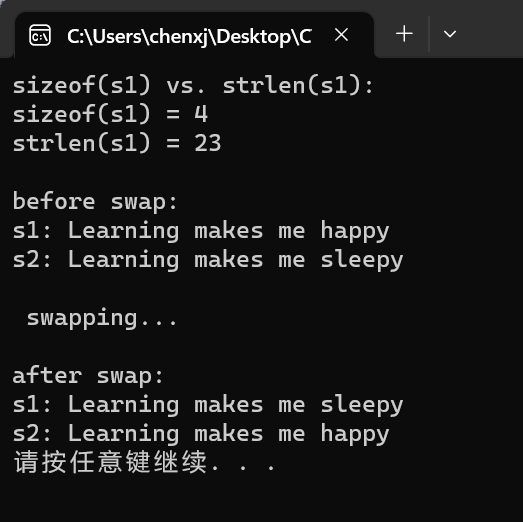
问题1:存放的是字符串。sizeof(s1)计算的是指针变量s1所占的内存空间大小,strlen(s1)统计的是存放字符串的长度。
问题2:能。task2_1是定义一个字符型数组,把字符串储存进数组里面,task2_2是定义一个指针变量,先占用内存,再把字符串储存进去。
问题3:交换的是指针变量的值,在内存单元中没有交换。
3.实验任务3
1 #include<stdio.h> 2 #include<stdlib.h> 3 4 void str_cpy(char *target,const char *source); 5 void str_cat(char *str1,char *str2); 6 7 int main() 8 { 9 char s1[80], s2[20] = "1984"; 10 11 str_cpy(s1,s2); 12 puts(s1); 13 14 str_cat(s1," Animal Farm"); 15 puts(s1); 16 17 system("pause"); 18 return 0; 19 } 20 21 void str_cpy(char *target,const char *source) 22 { 23 while(*target++ = *source++) 24 ; 25 } 26 27 void str_cat(char *str1,char *str2) 28 { 29 while(*str1) 30 str1++; 31 32 while(*str1++ = *str2++) 33 ; 34 }
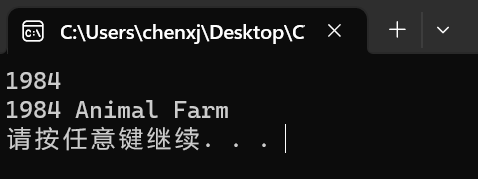
4.实验任务4
1 #include<stdio.h> 2 #include<stdlib.h> 3 #define N 80 4 5 int func(char *); 6 7 int main() 8 { 9 char str[80]; 10 11 while(gets(str)!=NULL) 12 { 13 if(func(str)) 14 printf("yes\n"); 15 else 16 printf("no\n"); 17 } 18 19 system("pause"); 20 return 0; 21 } 22 23 int func(char *str) 24 { 25 char *begin, *end; 26 27 begin = end = str; 28 29 while(*end) 30 end++; 31 32 end--; 33 34 while(begin < end) 35 { 36 if(*begin!= *end) 37 return 0; 38 else 39 { 40 begin++; 41 end--; 42 } 43 } 44 return 1; 45 }
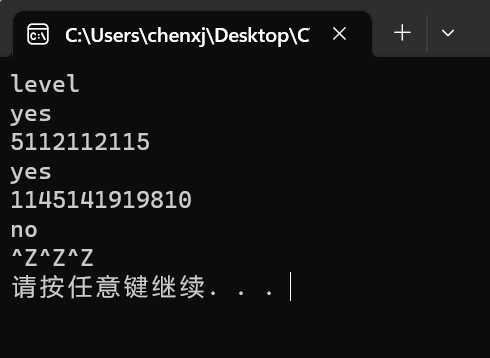
5.实验任务5
1 #include<stdio.h> 2 #include<stdlib.h> 3 #define N 80 4 5 void func(char *); 6 7 int main() 8 { 9 char s[N]; 10 11 while(scanf("%s",s)!=EOF) 12 { 13 func(s); 14 puts(s); 15 } 16 17 system("pause"); 18 return 0; 19 20 } 21 22 void func(char *str) 23 { 24 int i; 25 char *p1,*p2,*p; 26 27 p1 = str; 28 while(*p1 == '*') 29 p1++; 30 p2 = str; 31 while(*p2) 32 p2++; 33 p2--; 34 35 while(*p2 == '*') 36 p2--; 37 38 p = str; 39 i = 0; 40 while(p < p1) 41 { 42 str[i] = *p; 43 p++; 44 i++; 45 } 46 47 while(p <= p2) 48 { 49 if(*p!='*') 50 { 51 str[i] = *p; 52 i++; 53 } 54 p++; 55 } 56 57 while(*p!='\0') 58 { 59 str[i] = *p; 60 p++; 61 i++; 62 } 63 64 str[i] = '\0'; 65 }
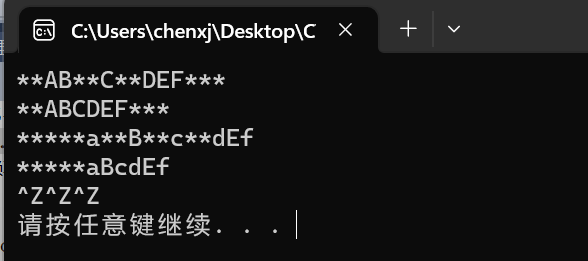
6.实验任务6
1 #include<stdio.h> 2 #include<string.h> 3 #include<stdlib.h> 4 void sort(char *name[],int n); 5 6 int main() 7 { 8 char *course[4] = {"C Program", 9 "C++ Object Oriented Program", 10 "Operating System", 11 "Data Structure and Algorithms"}; 12 int i; 13 14 sort(course,4); 15 16 for(i = 0;i < 4;i++) 17 printf("%s\n",course[i]); 18 19 system("pause"); 20 return 0; 21 } 22 23 void sort(char *name[],int n) 24 { 25 int i,j; 26 char *tmp; 27 28 for(i = 0;i < n - 1;++i) 29 for(j = 0;j < n - 1;++j) 30 if(strcmp(name[j],name[j+1])>0) 31 { 32 tmp = name[j]; 33 name[j] = name[j+1]; 34 name[j+1] = tmp; 35 } 36 }
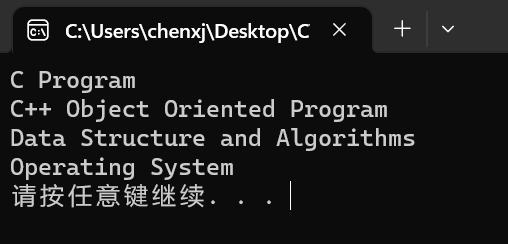
1 #include<stdio.h> 2 #include<string.h> 3 #include<stdlib.h> 4 void sort(char *name[],int n); 5 6 int main() 7 { 8 char *course[4] = {"C Program", 9 "C++ Object Oriented Program", 10 "Operating System", 11 "Data Structure and Algorithms"}; 12 int i; 13 14 sort(course,4); 15 16 for(i = 0;i < 4;i++) 17 printf("%s\n",course[i]); 18 19 system("pause"); 20 return 0; 21 } 22 23 void sort(char *name[],int n) 24 { 25 int i,j,k; 26 char *tmp; 27 28 for(i = 0;i < n - 1;++i) 29 { 30 k = i; 31 for(j = i+1;j < n;++j) 32 if(strcmp(name[j],name[k])<0) 33 k = j; 34 35 if(k!=i) 36 { 37 tmp = name[i]; 38 name[i] = name[k]; 39 name[k] = tmp; 40 } 41 } 42 }
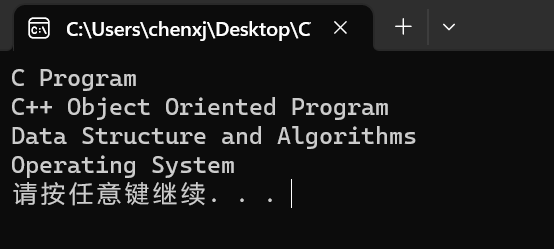
交换的是指针变量的值。
7.实验任务7
1 #include<stdio.h> 2 #include<stdlib.h> 3 #include<string.h> 4 #define N 5 5 6 int check_id(char *str); 7 8 int main() 9 { 10 char *pid[N] = {"31010120000721656X", 11 "330106199609203301", 12 "53010220051126571", 13 "510104199211197977", 14 "53010220051126133Y"}; 15 int i; 16 17 for (i = 0; i < N; ++i) 18 if (check_id(pid[i])) // 函数调用 19 printf("%s\tTrue\n", pid[i]); 20 else 21 printf("%s\tFalse\n", pid[i]); 22 23 system("pause"); 24 return 0; 25 } 26 27 // 函数定义 28 // 功能: 检查指针str指向的身份证号码串形式上是否合法。 29 // 形式合法,返回1,否则,返回0 30 int check_id(char *str) 31 { 32 int i; 33 for(i = 0;str[i]!='\0';) 34 i++; 35 if(i!=18) 36 return 0; 37 38 for(i = 0;str[i]!='\0';i++) 39 { 40 if(str[i]>='0'&&str[i]<='9'||str[i]=='X'); 41 else return 0; 42 43 } 44 45 return 1; 46 }
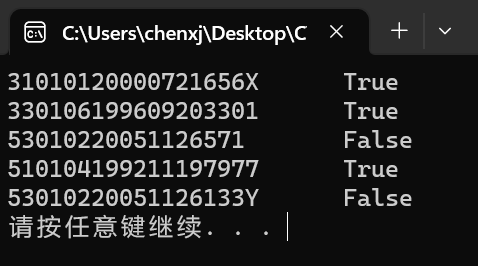
8.实验任务8
1 #include <stdio.h> 2 #include<stdlib.h> 3 #define N 80 4 void encoder(char *s); // 函数声明 5 void decoder(char *s); // 函数声明 6 7 int main() 8 { 9 char words[N]; 10 11 printf("输入英文文本: "); 12 gets(words); 13 14 printf("编码后的英文文本: "); 15 encoder(words); // 函数调用 16 printf("%s\n", words); 17 18 printf("对编码后的英文文本解码: "); 19 decoder(words); // 函数调用 20 printf("%s\n", words); 21 22 23 system("pause"); 24 return 0; 25 } 26 27 /*函数定义 28 功能:对s指向的字符串进行编码处理 29 编码规则: 30 对于a~z或A~Z之间的字母字符,用其后的字符替换; 其中,z用a替换,Z用A替换 31 其它非字母字符,保持不变 32 */ 33 void encoder(char *s) 34 { 35 int i; 36 for(i = 0;s[i]!='\0';i++) 37 { 38 if(s[i]>='a'&&s[i]<='z') 39 { 40 if(s[i]=='a') 41 s[i] = 'z'; 42 43 if(s[i]=='z') 44 s[i] = 'a'; 45 46 s[i] = s[i] + 1; 47 } 48 if(s[i]>='A'&&s[i]<='Z') 49 { 50 if(s[i]=='A') 51 s[i] = 'Z'; 52 53 if(s[i]=='Z') 54 s[i] = 'A'; 55 56 s[i] = s[i] + 1; 57 } 58 } 59 } 60 61 /*函数定义 62 功能:对s指向的字符串进行解码处理 63 解码规则: 64 对于a~z或A~Z之间的字母字符,用其前面的字符替换; 其中,a用z替换,A用Z替换 65 其它非字母字符,保持不变 66 */ 67 void decoder(char *s) 68 { 69 int i; 70 for(i = 0;s[i]!='\0';i++) 71 { 72 if(s[i]>='a'&&s[i]<='z') 73 { 74 if(s[i]=='a') 75 s[i] = 'z'; 76 77 if(s[i]!='a') 78 s[i] = s[i] - 1; 79 } 80 if(s[i]>='A'&&s[i]<='Z') 81 { 82 if(s[i]=='A') 83 s[i] = 'Z'; 84 85 if(s[i]!='A') 86 s[i] = s[i] - 1; 87 } 88 } 89 }
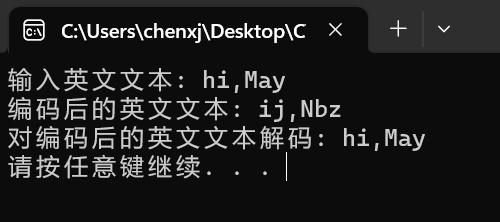

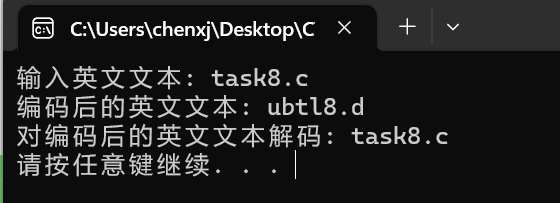
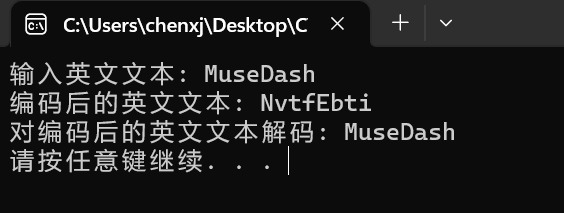


 浙公网安备 33010602011771号
浙公网安备 33010602011771号